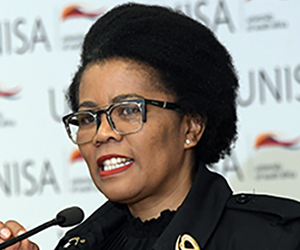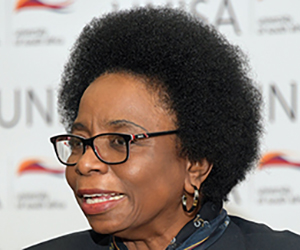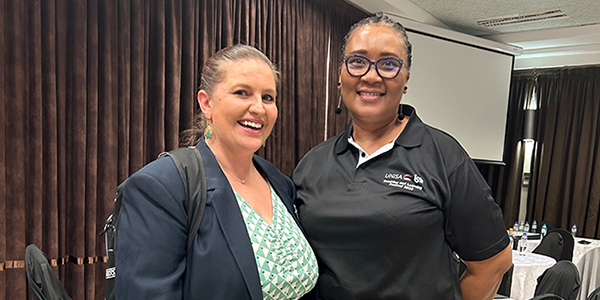College of Economic & Management Sciences
A journey towards inclusive 4IR in CODeL
Unisa's 8th Teaching and Learning Festival was held in person for the first time since the Covid-19 pandemic. A live-streaming option was available for those who couldn't attend. The theme was Unisa@150years: A journey towards inclusive 4IR in comprehensive, open distance and e-learning (CODeL).
Prof Puleng LenkaBula, Principal and Vice-Chancellor of Unisa, said the university management is committed to creating an enabling environment for staff to flourish and seize local and global opportunities. This will ensure that staff have multicultural and universal encounters to share with students so that they understand the international arena.
She explained: "We should teach students not only to absorb knowledge but also to become global citizens actively involved in how their governments are formed and held accountable." She added: "We should never separate ourselves from our societies. No matter how beautiful the theories we develop, our sole interest should be the solutions they can bring to challenges such as the recent disasters in Morocco and Libya or South Africa's enormous unemployment rate."
LenkaBula stressed: "We must think differently about the new world and rethink our curriculum." Referring to the recent BRICS summit held in South Africa, she argued that it wasn't only an opportunity for countries to meet. "It was a commitment of countries that recognise that the global distribution of economies, as well as natural and other resources, don't impact positively on all lives. The knowledge systems and contributions of Africans are not recognised in the world. This is a reason to reimagine the global agenda," she stressed.
Some 42 visiting vice-chancellors from Brazil also made her realise that Brazil, much like South Africa, aspires to contribute to the global arena.

Prof Puleng LenkaBula |

Prof Meahabo Magano |
"Because of a paradigm shift in CODeL, Unisa must secure its place in the rapidly evolving landscape of education by harnessing the power of technology to revolutionise teaching, learning and student support," Prof Meahabo Magano, Executive Director of the Department of Tuition Support and Facilitation of Learning, said in her address. She emphasised the importance of exploring alternative assessment methods which are current and relevant to the 4IR era.
"Unisa's graduates should be able to compete with their peers from other universities and be prepared for the challenges and opportunities of the 21st century. Unisa has embraced Artificial Intelligence (AI), networking and cooperation with other institutions. The licencing of the College of Agriculture and Environmental Sciences (CAES) staff to fly drones and the solar car built by students in the College of Science, Engineering and Technology (CSET) are evidence of it," she said.
Linking her address to the event's theme, the guest speaker, Jessica Nel, an education consultant from the Department of Curriculum Development and Transformation (DCDT), said that as the university moves forward, it is equally important not to leave anyone behind. For this reason, the unit does not only rely on the digital space. Although ADOVH engages online with students about Moodle and writing examinations, its staff also physically visit different areas. She said the emphasis is on students in rural areas to ensure they are not left behind.

Jessica Nel and Nhlanhla Radebe
In collaboration with the School for Business Leadership, the Colleges of Accounting Sciences and Economic and Management Sciences hosted the event. A live band and two poets ensured attendees were entertained throughout the event.
The winners of the 2023 Teaching and Learning Festival
| Faeeza Jaffer Nokuthula Mokgele |
Excellence Award for Module Design |
| Dr Ingrid Marais Tebogo Moswane |
Excellence Award for Student Support |
| Dr GS le Roux | Excellence Award for Innovation in Tuition |
| Prof Zurika Robinson Charles Leotlela Palesa Mpofu |
Excellence Award for Assessment |
A recording of the event is available here: https://www.youtube.com/watch?v=XAT5gLJmTwo
#Unisa150
* By Ilze Crous, Communication and Marketing Specialist, College of Economic and Management Sciences
Publish date: 2023/10/04

 Unisa co-hosts G20 community outreach in the Eastern Cape
Unisa co-hosts G20 community outreach in the Eastern Cape
 Unisans gain membership of prestigious science academies
Unisans gain membership of prestigious science academies
 Advocating for disability transformation through servant leadership
Advocating for disability transformation through servant leadership
 Unisa Press continues to illuminate the publishing space
Unisa Press continues to illuminate the publishing space